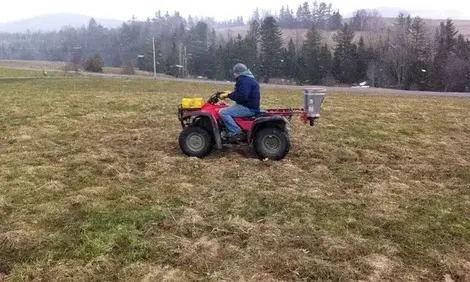



Sustainable Intensive Agriculture: The Route to Feeding 9 Billion by 2050
GLOBAL - Sustainable intensive agriculture is key to feeding nine billion by 2050. This was one of the topics discussed by Dr Sean Rickard at a conference held at the Farmers Club, London, organised by ANPARIO plc, Stuart Lumb reports.Dr Rickard is an economist at Cranfield University and a former adviser for the UK’s National Farmers’ Union (NFU). Dr Rickard has a reputation for being rather controversial and he put forward some very interesting suggestions in his presentation.
*
"...the FAO estimates that global cereal yields must rise by more than 40 per cent by 2050."
Expert reports have concluded that global food production will need to rise by 70-100 per cent by 2050 in response to a 30 per cent rise in global population and rapidly rising affluence in the developing world.
This assumes that there will not be a dramatic reduction in meat eating in rich countries nor a curbing of diet aspirations in developing countries, hence more food must be produced to keep food prices affordable . Food poverty is a growing issue in rich countries but for underdeveloped nations malnutrition and famine are growing threats.
Arable yields have to increase dramatically (the FAO estimates that global cereal yields must rise by more than 40 per cent by 2050) using less inputs and this can only be achieved by what Dr Rickard calls “sustainable intensification”.
He defines this as a significant increase in the production of livestock, livestock products and crops – accompanied by a reduction in the use of natural resources ie fossil fuels, minerals etc.
Sustainable intensification amounts to a dramatic increase in natural resource productivity achieved by:
- Technical efficiency : capital intensity.
- Technological advance : incremental and drastic innovation
What is needed is a new “Green Revolution” as we had in the 1960s- to produce more from less.
GMOs are held back plus cutbacks in research funding in the UK are not helping, consequently some of the CAP monies should be diverted into research projects. We are seeing only incremental advances in livestock and crop yields. What’s needed is drastic innovation and agro- biotechnological advances.
“These happen every 30 years so it’s about time for the next one”. Look how computers and the internet have drastically changed our lives – no one could have forseen that 30 years ago. In Dr Rickard’s opinion, “there is a romantic image of the countryside- in that it must be kept looking nice and that production of food is a minor aspect of farming.”
Organic farmers argue that organics are low input - but are also low output. A lower production of cereals could in principle be offset by reduced meat consumption in particular pigs and poultry but it would involve a radical change in western diets and a scaling back of developing nations’ aspirations.
Certainly the Chinese would be heartily dissatisfied if their pork and poultry consumption was reduced. The western world wastes a lot food, commented Dr Rickard, but studies suggest food waste is overstated.
Precision Farming
Precision farming uses technology such as using robots to milk cows and the use of driverless tractors. It also makes maximum use of our resources , whereby fertilisers are applied far more accurately, as are sprays and water( in the case of irrigated crops) , resulting in increased yields , plus precision farming benefits the environment as well. With vegetable production, hydroponics has big potential.
Precision farming involves expensive investment and large farms are needed as they enjoy economies of scale, become more efficient and have the size to generate sufficient profits to make the necessary investments.
Dr Rickard has issues with the CAP as 80 per cent of EU farms need subsidies to stay in profit/business.
The CAP is a social policy and is slowing down change in the EU. In the EU the poultry sector leads agriculture in terms of scale and technological advances, but the poultry industry’s supply chain is heavily dependent on the arable sector where progress is slower.
However, the EU poultry sector is a glowing example of efficiency, is not subsidised and a template for other aspects of agriculture.
Solving the trilemma
Food security: Only a significantly more productive ie intensive use of the natural resources that underpin farming can deliver the necessary increase in production.
Resource challenge: Farming depends on natural resources and it must use science and precision methods to increase output per unit of natural resources not only to keep costs under control but also to deliver a more sustainable industry.
Climate change: Agriculture generates 10 per cent of green house gas emissions and intensive farming not only reduces emissions but can also release less productive land.
To conclude, Dr Rickard stated: “The world will be fed in 2050 but not with the agricultural technology that we have today”.
TheCattleSite News Desk


